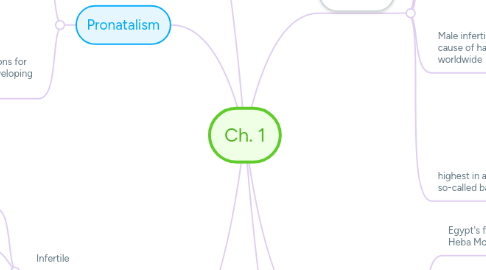
1. Infertility
1.1. about 12% rate of infertility in Egypt, higher than in developed nations
1.2. of the global population of infertile people, about half are Muslim
1.2.1. because a large portion of the "infertility belt" of Sub Saharan Africa is Muslim
1.3. tubal infertility is number one cause of infertility
1.4. Male infertility is the cause or an attributing cause of half of all cases of infertility worldwide
1.4.1. oligospermia – low sperm count
1.4.2. asthenospermia – poor motility
1.4.3. teratospermia – defects of sperm morphology
1.4.4. azoospermia – lack of sperm in the ejaculate
1.4.5. responds poorly to standard treatments (e.g., hormones and testicular surgeries)
1.4.5.1. must instead use new reproductive technologies (e.g., artificial insemination, ICSI or IVF)
1.5. highest in areas with high fertility – the so-called barrenness amid plenty phenomenon
2. Treatment
2.1. Egypt's first test-tube baby – Heba Mohammed in 1986
2.2. +- $3,000 per IVF treatment
2.2.1. more than 3x the average annual income of Egyptians
2.2.2. demand stays high; shortage of IVF drugs in area
2.3. Adoption is frowned upon in the Muslim religion
2.4. Early IVF period – 1988-1989
3. Religion
4. Infertility belt of Sub Saharan Africa
4.1. secondary infertility cases
4.2. due to preventable causes
4.2.1. Reproductive tract infections
4.2.1.1. including sexually-transmitted gonorrhea and chlamydia
4.3. about 1/3 of couples face infertility
5. Pronatalism
5.1. women do not contracept
5.1.1. leads to STDs
5.1.1.1. infertile women in developing world are at a higher risk of contracting HIV that fertile women
5.1.2. fear that contraceptives cause infertility
5.2. frequently cited reasons for having children in developing countries
5.2.1. 1. social security desires - through labor contributions or care of aging parents
5.2.2. 2. social power desires - leverage of rights in patrilocal extended families (patriarchal society)
5.2.2.1. also "stay together for the children" mentality sometimes prevents men from divorcing (abandoning) their wives
5.2.3. 3. social perpetuity desires - perceived need to continue kin-based group/familiar structures
6. Amira
6.1. Infertile
6.1.1. problem for her marriage
6.1.2. culture places high value on having children
6.1.3. she feels a profound absence of children in her life
6.1.3.1. acknowledges it might be different had she not given up her career for her husband.
6.1.4. husband has weak sperm
6.2. fertility treatments
6.2.1. IVF
6.2.2. ICSI
6.3. Egyptian
6.4. Muslim
6.4.1. Muslim doctor
6.4.2. donor sperm against religion

